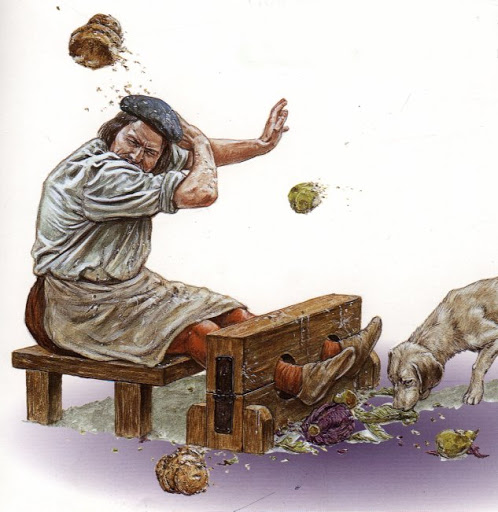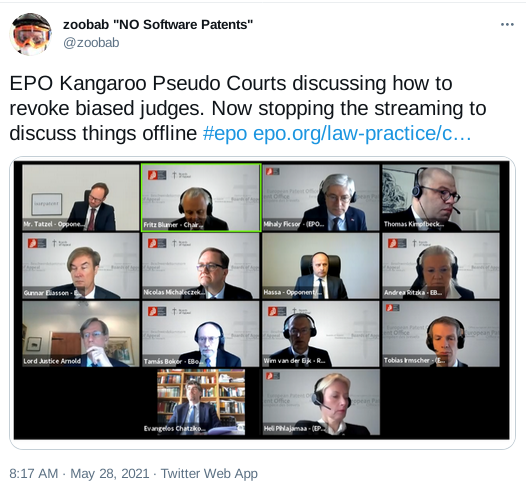

Many of the comments on the actions of the EBA have been quite critical.
In the last part we looked at the coverage of G 1/21 in the 'IP' blogosphere and noted the failure of most reports to get to grips with the important issues at stake in the present case.
"As often happens, the real "meat" is to be found in the comments which appear underneath the blog posts themselves."Some of the comments posted beneath the IPKat report are very perceptive and informative and deserve closer attention.
The first person to comment referred to the dismissal of the appellant's "compelling" submissions which alleged "continued lack of impartiality of the amended panel".
The poster concluded that "today marks a sad loss of the days when impartiality could be expected" from the EPO's Enlarged Board of Appeal.
The next person to comment added that "it also marks the end of the days where rules had to be obeyed (at least for the EBoA)" and continued as follows:
The EBoA discussed and refused request 1 (postponement of the Oral Proceedings) in non-public consultations only with the Appellant when there was no justification to exclude the public on this point, and granted request 2 (Oral Proceedings to discuss Art. 24 EPC) without obeying Rule 115 EPC.
And what about the approach that serving documents to parties and clause 2 of Art. 9 RPEBOA are not so important? Only in the last moment the EBoA "gracefully" granted (less than) one month for the Appellant to submit his observations. Surely, Art. 10 RPEBOA provides that third parties' observations (and amicus curiae submissions) "may be dealt with as the Board thinks fit".
This Board obviously thinks it fit to put them on an USB stick and then directly throw them in the bin. Which patent attorney right in his mind would put in his or her computer an USB stick that had been sent to him by mail? I hope none.
epo.org link) conducted back in September 2015:
Talking about an USB stick: when the EBA was called in to confirm the sacking of one of its members, the then president gave the EBA a stick with all alleged proof of the misbehaving of the accused member and told the EBA it should take knowledge of its content. At the time the EBA refused to look at it.
Now it is the BA which gives an USB stick to a party and tells it to take knowledge of its content. It is amazing to see how the EBA has evolved! Do not tell me that the EBA is really independent.
OP by video before the EBA do not give the guarantee that the representatives of the president cannot participate in the debate within the EBA. It might be far-fetched, but in view of the manner G 1/21 has been dealt with by the EBA up to now, I would not be surprised.
It is clear that the speed with which the chair of the BA called OP was to please the president. Without OP by ViCo no “New Normal”!
That on top [of the fact that] the EBA is not even aware of its own RP is as such a scandal.
That the chair of the BA had to be told by his peers that he should not act in G 1/21 also a scandal. I do not think that his credibility has increased.
Especially given the fundamental nature of the decision here, there should absolutely be sufficient time for all parties to prepare the case. This was true even before the two most crucial members of the EBoA have been exchanged mere days before the Oral Proceedings, and it is certainly true now. Compare this to a "normal" EBoA case in which the EPO has no "causa sua" interest and check how much time there usually is to prepare legal opinions and so on.
The letter of the opponent detailing its objections on suspected partiality is very interesting, cf.
https://register.epo.org/application?number=EP04758381&lng=en&tab=doclist (Letter of 24.05.2021)
For me the opponent convincingly shows that a decision untainted by suspicions of partiality is impossible for this case.
The reasons are multiple, but I would say that the fundamental one is the lack of independence of the (E)BoA.
The situation has been clearly rendered worse by the actions of the current President of the Boards, a position created with the latest reform.
Thus it seems that this reform under the pretense of increasing the (perception of) independence of the Boards has in fact aggravated the issue.
The whole way G 1/21 has been managed by the chair of the EBA shows amply that the BA are anything but independent.
The whole mess the BA/EBA finds itself in, is the direct result of the reform of the BA wanted by a former head of the EPO.
It is a scandal that members of the BA can only be reappointed if they have shown a given "performance". The criteria are still non-public. This is also scandalous!
Without leaning too far out of the window, performance means probably a certain flexibility of the spine associated with a production increasing every year like in DG1.
The EPO has indeed been degraded to a producer of "targets".
When one sees the number of patents revoked or severely limited in opposition because the grant procedure is flawed, it becomes alarming. Just look at the published decisions and draw your conclusions. As only 5% of patents are opposed, when you extrapolate to all the grants it is daunting!
The EBA is tumbling from one scandal to the next.
One wonder who will be the beneficiary of the deed!
I would say for some at the EPO the rules of law deserve a “dynamic interpretation”, and if they are not to their liking, they are simply ignored.
The tragic fact is that people in charge of paying due respect to the EPC are actually acting against it.
"Overall, there appeared to be a general consensus amongst the posters that the manner in which the case had been handled reflected poorly on the Enlarged Board of Appeal and gave serious cause for concern about the state of judicial independence at the EPO."As we have seen, a number of the comments were highly critical of the President of the Boards of Appeal, Carl Josefsson, who was deposed as chairman of the panel on 17 May.
However, as previously explained, despite the fact that Josefsson has been sidelined, he still remains in a position to exert an indirect influence on the proceedings.
In the next part we plan to take a closer look at this particular "elephant in the room". ⬆

President of FFII, who 'attended' the hearing, was more than impressed by the unprecedented transparency